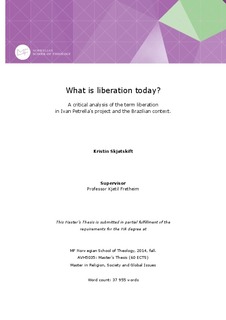What is liberation today? : a critical analysis of the term liberation in Ivan Petrella's project and the Brazilian context
Master thesis
Permanent lenke
http://hdl.handle.net/11250/285704Utgivelsesdato
2015-06-25Metadata
Vis full innførselSamlinger
Sammendrag
Liberation theology is a political movement that grew out of the Catholic church and the
wider Latin American context in the 1960s. It has been described as a moral reaction to
poverty and oppression, rooted in ordinary people’s lives and experience of poverty, and
expressed in a commitment to change social and political conditions. It is a call to action, a
promise of liberating people from material deprivation which grew into an international
movement, and this movement constructed models of political and economic organization that
intended to replace the unjust status quo. Liberation theology is a new way of doing theology
that involves a new use of Scripture to (re)interpret their situation, reading the Bible from the
perspective of the poor and marginalized.
Liberation theologians argued that in order to liberate the poor and oppressed, interpretations
of the Biblical texts and other religious sources had to be done in the context of social
theories, thus they made use of elements from various schools of thought.
In this thesis, I will conduct a literature study focusing on Petrella’s
work as the main material for my thesis, using the early work of Clodovis Boff, Leonardo
Boff, and Gustavo Gutiérrez as a basis for discussing Petrella’s project.
Liberation theology must
maintain the goal of replacing capitalism, and not give in on this struggle, and I suggest that
liberation can be obtained through a process consisting of three steps; rereading reality,
imagining alternatives, and increasing political will for creating and implementing these
alternatives. I don’t think the dream of liberation is utopia. A new system should and can be
created - "a new and better society is always possible". As long as people
are oppressed, there is a need for liberation, and I think liberation theology can contribute to
this process of constructing a better tomorrow.
